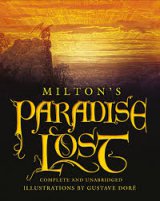Paradise Lost Page #18
Paradise Lost is an epic poem in blank verse by the 17th-century English poet John Milton. The first version, published in 1667, consisted of ten books with over ten thousand lines of verse. A second edition followed in 1674, arranged into twelve books with minor revisions throughout and a note on the versification.
Now to th’ ascent of that steep savage Hill Satan had journied on, pensive and slow; But further way found none, so thick entwin’d, As one continu’d brake, the undergrowth Of shrubs and tangling bushes had perplext All path of Man or Beast that past that way: One Gate there onely was, and that look’d East On th’ other side: which when th’ arch-fellon saw Due entrance he disdaind, and in contempt, At one slight bound high overleap’d all bound Of Hill or highest Wall, and sheer within Lights on his feet. As when a prowling Wolfe, Whom hunger drives to seek new haunt for prey, Watching where Shepherds pen thir Flocks at eeve In hurdl’d Cotes amid the field secure, Leaps o’re the fence with ease into the Fould: Or as a Thief bent to unhoord the cash Of some rich Burgher, whose substantial dores, Cross-barrd and bolted fast, fear no assault, In at the window climbes, or o’re the tiles; So clomb this first grand Thief into Gods Fould: So since into his Church lewd Hirelings climbe. Thence up he flew, and on the Tree of Life, The middle Tree and highest there that grew, Sat like a Cormorant; yet not true Life Thereby regaind, but sat devising Death To them who liv’d; nor on the vertue thought Of that life-giving Plant, but only us’d For prospect, what well us’d had bin the pledge Of immortalitie. So little knows Any, but God alone, to value right The good before him, but perverts best things To worst abuse, or to thir meanest use. Beneath him with new wonder now he views To all delight of human sense expos’d In narrow room Natures whole wealth, yea more, A Heaven on Earth, for blissful Paradise Of God the Garden was, by him in the East Of Eden planted; Eden stretchd her Line From Auran Eastward to the Royal Towrs Of great Seleucia, built by Grecian Kings, Or where the Sons of Eden long before Dwelt in Telassar: in this pleasant soile His farr more pleasant Garden God ordaind; Out of the fertil ground he caus’d to grow All Trees of noblest kind for sight, smell, taste; And all amid them stood the Tree of Life, High eminent, blooming Ambrosial Fruit Of vegetable Gold; and next to Life Our Death the Tree of Knowledge grew fast by, Knowledge of Good bought dear by knowing ill. Southward through Eden went a River large, Nor chang’d his course, but through the shaggie hill Pass’d underneath ingulft, for God had thrown That Mountain as his Garden mould high rais’d Upon the rapid current, which through veins Of porous Earth with kindly thirst up drawn, Rose a fresh Fountain, and with many a rill Waterd the Garden; thence united fell Down the steep glade, and met the neather Flood, Which from his darksom passage now appeers, And now divided into four main Streams, Runs divers, wandring many a famous Realme And Country whereof here needs no account, But rather to tell how, if Art could tell, How from that Saphire Fount the crisped Brooks, Rowling on Orient Pearl and sands of Gold, With mazie error under pendant shades Ran Nectar, visiting each plant, and fed Flours worthy of Paradise which not nice Art In Beds and curious Knots, but Nature boon Powrd forth profuse on Hill and Dale and Plaine, Both where the morning Sun first warmly smote The open field, and where the unpierc’t shade Imbround the noontide Bowrs: Thus was this place, A happy rural seat of various view; Groves whose rich Trees wept odorous Gumms and Balme, Others whose fruit burnisht with Golden Rinde Hung amiable, Hesperian Fables true, If true, here onely, and of delicious taste: Betwixt them Lawns, or level Downs, and Flocks Grasing the tender herb, were interpos’d, Or palmie hilloc, or the flourie lap Of som irriguous Valley spread her store, Flours of all hue, and without Thorn the Rose: Another side, umbrageous Grots and Caves Of coole recess, o’re which the mantling Vine Layes forth her purple Grape, and gently creeps Luxuriant; mean while murmuring waters fall Down the slope hills, disperst, or in a Lake, That to the fringed Bank with Myrtle crownd, Her chrystall mirror holds, unite thir streams. The Birds thir quire apply; aires, vernal aires, Breathing the smell of field and grove, attune The trembling leaves, while Universal Pan Knit with the Graces and the Hours in dance Led on th’ Eternal Spring. Not that faire field Of Enna, where Proserpin gathring flours Her self a fairer Floure by gloomie Dis Was gatherd, which cost Ceres all that pain To seek her through the world; nor that sweet Grove Of Daphne by Orontes, and th’ inspir’d Castalian Spring might with this Paradise Of Eden strive; nor that Nyseian Ile Girt with the River Triton, where old Cham, Whom Gentiles Ammon call and Libyan Jove, Hid Amalthea and her Florid Son Young Bacchus from his Stepdame Rhea’s eye; Nor where Abassin Kings thir issue Guard, Mount Amara, though this by som suppos’d True Paradise under the Ethiop Line By Nilus head, enclos’d with shining Rock, A whole dayes journey high, but wide remote From this Assyrian Garden, where the Fiend Saw undelighted all delight, all kind Of living Creatures new to sight and strange: Two of far nobler shape erect and tall, Godlike erect, with native Honour clad In naked Majestie seemd Lords of all, And worthie seemd, for in thir looks Divine The image of thir glorious Maker shon, Truth, Wisdome, Sanctitude severe and pure, Severe, but in true filial freedom plac’t; Whence true autoritie in men; though both Not equal, as thir sex not equal seemd; For contemplation hee and valour formd, For softness shee and sweet attractive Grace, Hee for God only, shee for God in him: His fair large Front and Eye sublime declar’d Absolute rule; and Hyacinthin Locks Round from his parted forelock manly hung Clustring, but not beneath his shoulders broad: Shee as a vail down to the slender waste Her unadorned golden tresses wore Dissheveld, but in wanton ringlets wav’d As the Vine curles her tendrils, which impli’d Subjection, but requir’d with gentle sway, And by her yeilded, by him best receivd, Yeilded with coy submission, modest pride, And sweet reluctant amorous delay. Nor those mysterious parts were then conceald, Then was not guiltie shame, dishonest shame Of natures works, honor dishonorable, Sin-bred, how have ye troubl’d all mankind With shews instead, meer shews of seeming pure, And banisht from mans life his happiest life, Simplicitie and spotless innocence. So passd they naked on, nor shund the sight Of God or Angel, for they thought no ill: So hand in hand they passd, the lovliest pair That ever since in loves imbraces met, Adam the goodliest man of men since borne His Sons, the fairest of her Daughters Eve. Under a tuft of shade that on a green Stood whispering soft, by a fresh Fountain side They sat them down, and after no more toil Of thir sweet Gardning labour then suffic’d To recommend coole Zephyr, and made ease More easie, wholsom thirst and appetite More grateful, to thir Supper Fruits they fell, Nectarine Fruits which the compliant boughes Yeilded them, side-long as they sat recline On the soft downie Bank damaskt with flours: The savourie pulp they chew, and in the rinde Still as they thirsted scoop the brimming stream; Nor gentle purpose, nor endearing smiles Wanted, nor youthful dalliance as beseems Fair couple, linkt in happie nuptial League, Alone as they. About them frisking playd All Beasts of th’ Earth, since wilde, and of all chase In Wood or Wilderness, Forrest or Den; Sporting the Lion rampd, and in his paw Dandl’d the Kid; Bears, Tygers, Ounces, Pards Gambold before them, th’ unwieldy Elephant To make them mirth us’d all his might, & wreathd His Lithe Proboscis; close the Serpent sly Insinuating, wove with Gordian twine His breaded train, and of his fatal guile Gave proof unheeded; others on the grass Coucht, and now fild with pasture gazing sat, Or Bedward ruminating: for the Sun Declin’d was hasting now with prone carreer To th’ Ocean Iles, and in th’ ascending Scale Of Heav’n the Starrs that usher Evening rose: When Satan still in gaze, as first he stood, Scarce thus at length faild speech recoverd sad.
Translation
Translate and read this book in other languages:
Select another language:
- - Select -
- 简体中文 (Chinese - Simplified)
- 繁體中文 (Chinese - Traditional)
- Español (Spanish)
- Esperanto (Esperanto)
- 日本語 (Japanese)
- Português (Portuguese)
- Deutsch (German)
- العربية (Arabic)
- Français (French)
- Русский (Russian)
- ಕನ್ನಡ (Kannada)
- 한국어 (Korean)
- עברית (Hebrew)
- Gaeilge (Irish)
- Українська (Ukrainian)
- اردو (Urdu)
- Magyar (Hungarian)
- मानक हिन्दी (Hindi)
- Indonesia (Indonesian)
- Italiano (Italian)
- தமிழ் (Tamil)
- Türkçe (Turkish)
- తెలుగు (Telugu)
- ภาษาไทย (Thai)
- Tiếng Việt (Vietnamese)
- Čeština (Czech)
- Polski (Polish)
- Bahasa Indonesia (Indonesian)
- Românește (Romanian)
- Nederlands (Dutch)
- Ελληνικά (Greek)
- Latinum (Latin)
- Svenska (Swedish)
- Dansk (Danish)
- Suomi (Finnish)
- فارسی (Persian)
- ייִדיש (Yiddish)
- հայերեն (Armenian)
- Norsk (Norwegian)
- English (English)
Citation
Use the citation below to add this book to your bibliography:
Style:MLAChicagoAPA
"Paradise Lost Books." Literature.com. STANDS4 LLC, 2024. Web. 23 Nov. 2024. <https://www.literature.com/book/paradise_lost_101>.




Discuss this Paradise Lost book with the community:
Report Comment
We're doing our best to make sure our content is useful, accurate and safe.
If by any chance you spot an inappropriate comment while navigating through our website please use this form to let us know, and we'll take care of it shortly.
Attachment
You need to be logged in to favorite.
Log In